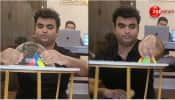Alexander Blass, CEO, Innovation Institute of America, shared some important notes on innovation at the recently concluded Enterpreneurship Summit of IIT-B Prachi Rege reports.
"Innovators are not born they are created," said Alexander Blass, CEO, Innovation Institute of America, at the recently concluded Enterpreneurship Summit 2014, held at IIT-B campus. Organised by the Enterpreneurship Cell of IIT-B, the theme of this year`s E-Summit was—Dream, Discover and Disrupt.
In his key note speech, Blass focused on the human side of innovation. He discussed the question, "Where do these innovations originate from?" Citing an analogy of a tool box, he said, "Each individual has two tool boxes in life. One is a personal tool box and the other is a professional tool box.
These two impact the way entrepreneurs, leaders or innovators are developed in society."
While a personal tool box comprised one`s culture, value and ethics that one had acquired from family and friends, Athe professional tool box was made up of one’s work resume and experience, the inspirations one drew from one’s academic and work life, he said. “It is therefore important to ask yourself the fundamental question—what drives you?” He pointed out that opportunities, experience, passion and values collide and motivate a person to innovate.
The innovation ecosystem was made of a wheel, observed Bass. Each spoke of this wheel defined a form of innovation. First spoke was the mindset or culture to develop innovation, second was the innovation of the product and service, and the third was the way one sold and marked the innovation to the customer. "If a tree falls in the forest no one will know about it unless one makes a buzz around it," he quipped. According to him, "innovators are more impactful as compared to those slotted as `game changers`.” Not every innovation may be a game changer, he added.
Blass shared details on the five axioms of innovation with his eager audience. "These axioms are already applied by companies across sectors to create innovative products and services," he said.
The first axiom— being emphatic to what people really value is far more important than market research. Innovators who followed this axiom had an emotional inclination towards their business.
Blass spoke about design firms Ideo and Steelcase, which undertook a project to design better chairs for classroom. They used the concept of ethnography— a study that objectively observes an ethnic group`s behaviour. "The firms didn`t interview the students. Instead they observed their behavior in the classroom," explained Blass. The result of this research led to the creation of `node chairs` which have wheels. As a result they could be moved anywhere in the class. Thus facilitating collaborative study—a vital necessity in the education field today. Though Steelcase was entering the education furniture market for the first time, they secured a preorder for 5000 chairs sold for 600$ each. Thus earning them a whooping $3 million in one go.
The second axiom —your innovation says a lot about your passion and your values. "Your experiences are responsible for igniting a fire in your belly," explained Blass. “It is important to evaluate the social impact of your innovative product or service. Make your innovation about your customer—how will it impact their lives for good? "You can do well, by doing good," advised Blass.
The third axiom—regret is far worse than failure. He sited the example of innovator Nicohlas Woodman, founder and CEO, GoPro, a company that manufactures versatile cameras. After his first venture failed to launch, Woodman went on to setup GoPro which invented a 35mm camera that could be attached to the palm to shoot pictures while one was engaged into an adventure sport like surfing. As of September 2013, Woodman`s networth was closer to $1.3 billion.
The fourth axiom —if people don`t tell you that your idea is crazy, it is probably not that innovative". Blass quoted automobile genius Henry Ford, "If I had asked my customers what they wanted, they would have said a faster horse." People don`t always know what they want. But an innovator can create a need that they thought didn`t exist.
The fifth axiom—true innovation always improves the human experience. "It must challenge the status quo and question convention," reflected Blass. Not heeding negative comments would pave the way to think differently and execute your innovative idea successfully. "Never ever forget who you are, where you come from, how you got there and who got you there. Converge your innovation with your inspiration," he signed off.
Create innovation framework
1) C - Cutting or eliminating an element of a product/ service that is already in use for developing it innovatively
2) R – Replacing the existing product/ service with an innovative one
3) E - Evolve a part of a product/ service for use in other applications
4) A – Apply a part of the product/ service elsewhere or assimilate it with elements of other products/ services
5) T – Turnaround the process which is used in a current product/ service
6) E – Enlarge or reduce the current application of a certain product/ service















